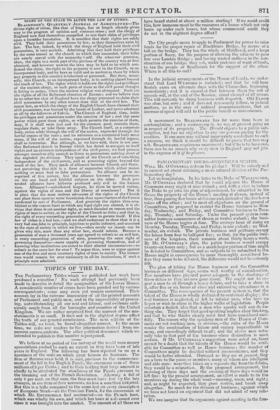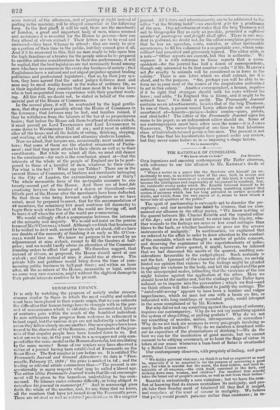PARLIAMENTARY HOURS — O'CONNELL'S SCHEME. WILL Mr. O'CoNNEeL redeem his pledge? Will
he soberly and in earnest set about obtaining a more rational division of the Par- liamentary day ? Let us recapitulate. In his letter to the Duke of WELLINGTON, Mr. O'CONNELL declared that he would adjourn the House of Commons every night at nine o'clock ; and, with a view to induce the Duke to go into his plan of adjournment, he submitted to his Grace the propriety of the House's meeting at eleven, instead or four, thus gaining five hours at the one end, instead of the five hours taken off the other ; and to meet all objections on the ground of Committees, he proposed to restrict the House business to Mon- day, Wednesday, and Friday, and Committee business to Tues- day, Thursday, and Saturday. Under the present system com- mittee business commences at eleven or twelve o'clock ; the busi- ness of the House begins at four. The average hour of rising on Monday, Tuesday, Thursday, and Friday, is one o'clock ; on Wed- nesday, six o'clock. The private business and petitions occupy the house from four to half-past five ; so that, for the public busi- ness of the kingdom, there remains about thirty hours a week. By Mr. O'CONNELL'S plan, the public business would occupy twenty-six hours only; but as a much larger portion of time might be devoted to Committees, and as subjects to he submitted to the House might in consequence be more thoroughly considered be- fore they came to be debated, the difference would not be seriously felt.
The plan of taking the House business and the Committee business on different days, seems well worthy of consideration.. Few members have physical power adequate to the discharge of these duties as they are now gone about. We ought not to ex- pect a man to sit through a heavy debate, and to take a share in it, after five or six hours of close and exhausting attendance in a Committee. The consequence of the present system is, that the talent of the House is wholly dedicated to oratorical display ; the real business is neglected, or left to inferior men, who have no hopes or wish to shine in the higher walks of legislation. People entertain a foolish idea that a man who speaks well can do no- thing else. They forget that good speaking implies clear thinking, and that he who thinks clearly must first have considered care- fully. The reason why the speaking men of the House of Com- mons are not working men, is obvious,—the rules of the House render the combination of labour and oratory impracticable to many, and exceedingly difficult to all; and the clever men natu- rally take to that part of the business where distinction is most certain. If Mr. 0-ConNELL's'suggestion were acted on, there cannot be a doubt that the talents of the House would be avail- able for Committee as well as House business ; the number of Committees might be doubled without inconvenience, and they would be better attended. Managed as they are at present, they are a bore to the younger members, many of whom are intelligent and able men: were they taken on a separate day from the debate, they would be a relaxation. By the proposed arrangement, the morning of three days and the evening of three days would be left free : by the present arrangement, an effort is made to tie the members up during the whole week—morning, noon, and night; and, as might be expected, they grow restive, and break away altogether. So much for the division of business ; against which we have not heard an argument that did not admit of easy refu- tation.
We can imagine that the arguments against meeting in the fore. noon instead of the afternoon, and of parting at night instead of parting in the morning, will be shaped somewhat in the following form. In the first plack it will be said, there are the merchants of London, a great and important body of men, whose counsel and assistance it is essential for the House to possess—how can they attend at eleven o'clock ? Their letters are to be read and answered—they have 'Change to attend : they are ready to give up a portion of their time to the public, but they cannot give it all. And if it be answered to this, that no man ought to take upon him the high functions of a trustee for the people unless he be prepared to sacrifice inferior considerations to their due performance, it will be replied, that the best legislators are not necessarily found among men who have no concern in the every-day business of society ; that Englishmen have a natural and not unjust prejudice against trading politicians and professional legislators ; that as, by their jury sys- tern, they have agreed that the safest judges between man and man may be most readily found in the walks of ordinary life, so in their legislation they consider that man most fit to devise laws who is best acquainted from experience with their practical work- ing. All this will, we doubt not, be stated in behalf of the com- mercial part of the House of Commons. In the second place, it will be contended by the legal gentle- men, that they cannot possibly attend the House of Commons in the forenoon ; that fortunes may be lost, and families ruined, if they be withdrawn from the labours of the bar at so preposterous hours ; that before the House ask them to attend at eleven o'clock, it must prevail on Lord TENTERDEN and Lord LYNDHURST to come down to Westminster Hall at six ; and it must in addition alter all the hours and all the habits of eating, drinking, sleeping, and working, of all the attornies and attornies clerks in London. Now we admit, that lawyers are, occasionally, most useful mem- bers; that some of them are the chiefest ornaments of Parlia- ment; and that they must attend to their clients as well as to their constituents. But while we admit all this, we must still demur to the conclusion—for such is the conclusion aimed at-that the interests of the whole of the people of England are to be post- poned to those of a handful of men, whatever be their value. For what is the fact ? What say our Tables? There are in the present House of Commons, of bankers and merchants belonging to the City of London, the extraordinary number of thirty ! The whole mercantile force of the metropolis amounts to one twenty-second part of the House. And there are of bona' fide practising lawyers the number of a dozen or thereabout—one fiftieth part of the House after the merchants have been deducted. So that those who bring forward such objections as we have noted, must be prepared to assert, that for the accommodation of 401tnembers; the remaining '618 must continue till doomsday to begin-their work when'the rest of the world are leaving off, 'and• fo leave it off when the rest of the world are commencing.
We would willingly effect a compromise between the interests of the minority and majority. We would not insist on the precise terms of Mr.O'CONNELL'S bond. Although we think that business,if it be wished to do it well, cannot be too early set about, still we have our doubts of the necessity of finishing it so early as Mr. O'CoN- NELL would have us. We know no purpose to be served by an adjournment at nine o'clock, except to fill the theatres at half- price;, and we would hardly advise an alteration of the Commons' standing orders to effect that good. We therefore suggest, that instead of eleven, as , proposed, the House should meet at one o'clock; and that instead of nine, it should rise at eleven. The private bills and petitions would bring down the time of com- mencing public business to half-past three ; and within an hour after, all the members of the House, _mercantile or legal, unless on some very rare occasion, might without the slightest damage to their private interests contrive to be present.



























 Previous page
Previous page